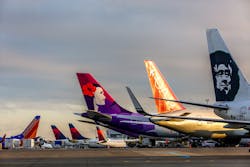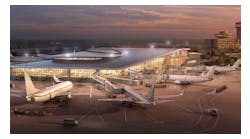Port of Seattle Commission Becomes First U.S. Port with 10-Year Goal to Transition to Sustainable Aviation Fuels
The Port of Seattle Commission became the first United States airport operator to set a specific timetable and goals for reducing the use of fossil fuels and transitioning all airlines at Seattle-Tacoma International Airport to commercially competitive sustainable aviation fuels. In a motion, the Commission called for a minimum of 10 percent of available jet fuel to be produced locally from sustainable sources within ten years, increasing to 50 percent by 2050.
The motion continues the Port’s work to reduce reliance on fossil fuels and help airlines transition to sustainable aviation fuels (SAF). In 2016 the Port worked with Boeing and Alaska Airlines for a first-of-its-kind study identifying the best infrastructure options for the delivery of SAF to Sea-Tac. The Port also worked with Carbon War Room on a report analyzing supply chain financing options.
The Port believes the timetable will create a market signal to facilitate the establishment of a domestic/local source of SAF at a commercially competitive rate.
In addition, the motion also recognizes the environmental impact to local communities and how SAF could bring the additional benefit of reducing ultrafine particles (UFPs) that could have detrimental impact on air quality and human health.
”The tremendous growth of our airport needs to be met with equally bold efforts to reduce impacts on the environment and the health of the surrounding communities, said Port of Seattle Commissioner Fred Felleman. “I’m so fortunate to be able to help carry on the great work Commissioner Creighton has pioneered to keep Sea-Tac a national leader in sustainable aviation fuels.”
The Port of Seattle Century Agenda includes the goal of reducing greenhouse gas emissions that the Port does not have direct control over, but can influence, by 50 percent by 2030 and to meet increased energy needs through conservation and renewable sources.
“There are innumerable innovative and world-changing ideas that come from our state,” said Washington State Governor Jay Inslee. “We’re the birthplace of aviation. The technology companies that have changed the course of our daily lives got their start here. And now we are leading on environmental innovations that will transition this industry away from harmful fossil fuels. The work that the Port of Seattle, in a partnership with other statewide leaders like Boeing, Alaska Airlines, and WSU, is a perfect example of this innovative spirit that will change our world. We are proud to support their effort, and to continue to keep our state on the leading edge.”
“I couldn’t be more proud that my last vote as a Port Commissioner was to set a vision on sustainable aviation fuels, important in reducing particulates in communities around the airport, said Port of Seattle Commissioner John Creighton. “I look forward to seeing how the Port implements this vision – there is a still lot of work ahead.”
The health of our community is very important and this effort will lead to cleaner fuels and a cleaner environment,” said Port of Seattle Commissioner Stephanie Bowman. We look forward to working with community, airlines and other stakeholders to achieve our goals.”
The motion will advance the port’s well-established efforts to transition to SAF at Sea-Tac Airport, the Port of Seattle adopted the following goals:
- By 2028, 10 percent of jet fuel available at Sea-Tac will be produced locally from sustainable sources.
- By 2035, 25 percent of jet fuel available at Sea-Tac will be produced locally from sustainable sources.
- By 2050, the maximum blend currently approved for jet fuel produced locally from sustainable sources e.g. 50 percent from sustainable sources is the maximum blend currently approved for HEFA-based SAF.
The Port will work with airlines and distributors to develop the market for sustainable aviation fuels, steps that are critical to making the fuels cost competitive without subsidies.
The five-point plan to make sustainable aviation fuels more cost-competitive includes initiatives to:
- Support state and federal legislation establishing cost-effective regulations consistent with bills, executive orders, policies and regulations implemented in the State of California and Oregon and the Province of British Columbia; or similar provision that includes options for aviation tax credits as well as renewable diesel for marine and on road use.
- Advocate for new FAA grant programs that support SAF by recognizing air quality benefits of the fuel.
- Seek mutual financial investments with the Port and its partners.
- Partner with other agencies who could help build market demand for SAF, including: Washington State Ferries, cruise lines, tug boat operators, other harbor craft, truck operators, fishing boats, the United States Coast Guard and the Department of Defense.



